| Visual fields/Sichtfelder: |
 |
DBC. The viewing window counts.
DBC. Das Sichtfenster zählt. |
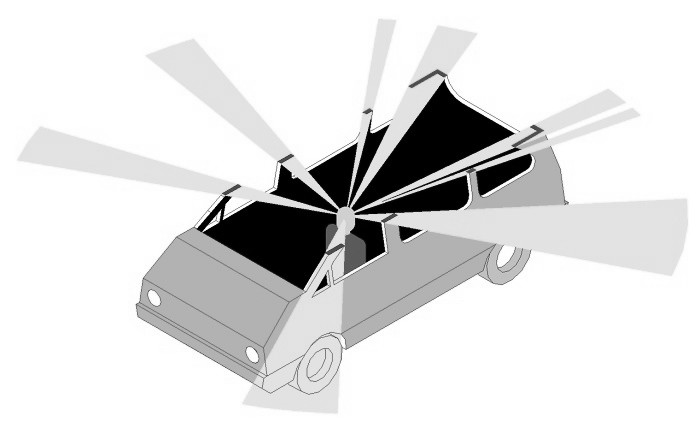
DBC | The panorama decide, because every little counts. Das Panorama entscheidet, denn es kommt auf jede Kleinigkeit an.
 |
The viewing window counts.
→ The field of vision is crucial.
3. Step "Think safe"
→ Think global, act local.
The following parable will be an example:
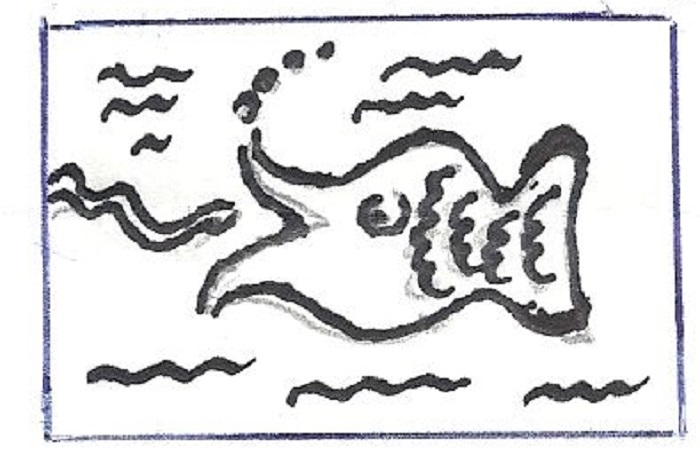
© DBC | "The everyday occurance", Prof. Dr. Martin Grabe
The Fisherman and the Fish
→ Picture 1
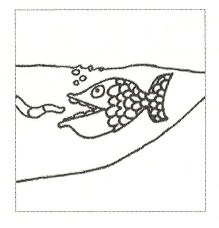
© Prof. Dr. Martin Grabe
The fisherman and the fish.
(picture 1) |
Please, look at this fish!
(Picture 1)
The question is:
- The fish feel good or bad?
A possible answer:
- This fish feel good, because the fish is on the verge of catching a worm!
→ Picture 2
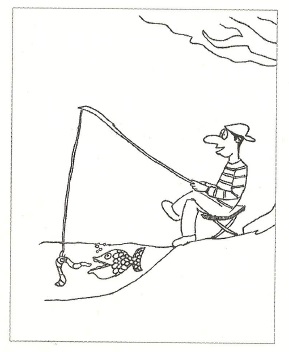
© Prof. Dr. Martin Grabe
The fisherman and the fish
(picture 2) |
Please, look now at the fish and the fisherman!
(Picture 2)
The question is again:
- The fish feel good or bad?
The answer only can be:
-
This fish feel rather bad, because this fish is in a no-win situation! The reason is, that this fish is on the verge of catching a worm, which hangs on a fishhook! Therefore it seems, that the fisherman is so much better than the fish!
→ Picture 3
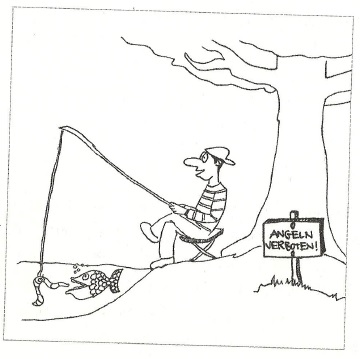
© Prof. Dr. Martin Grabe
The fisherman and the fish
(picture 3) |
Please, look now at the fish, the fisherman and the prohibition sign!
(Picture 3)
The question is:
- Actually, the fisherman is so much better than the fish?
The answer:
-
Both, the fish and the fisherman must feel bad, because the fish is on the verge of catching a worm, which hangs on a fishhook and the fisherman is in danger to violate the law concerning the visible prohibition sign "Fishing is strictly forbidden!"
→ Picture 4
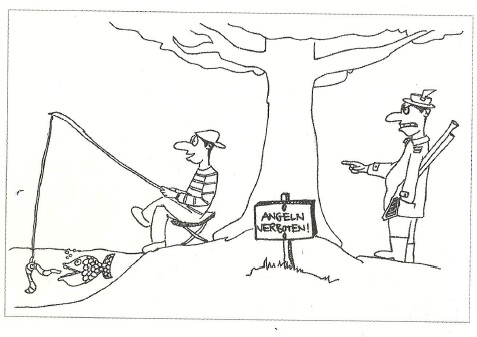
© Prof. Dr. Martin Grabe
The fisherman and the fish.
(picture 4) |
Please look at the fish, the fisherman and to the ranger!
(Picture 4)
The question is:
- How is the actual situation for the fish, the fisherman and the ranger?
Final assessment:
-
For the fish there is an unexpectable twist of fate, because while the fisherman will feel worst, because he has to accept a punishment by the ranger, the tide has turned completely for the fish. Chances are, that the fisherman his fishing rod lay aside, before the fish will snatch the worm and the fishhook!
Résumé
We can see, that it depends, in which context a problem is presented, because embedded into a context, an actual situation can take a turn for the worse and vice versa!
DBC. Our mindset.
→ The principles are crucial.
Das Sichtfenster zählt.
Auf das Sichtfeld kommt es an.
3. Schritt "Think safe"
→ Denke global, handle lokal.
Die folgende Parabel will ein Beispiel sein:

© DBC | "Die Alltagsfalle", Prof. Dr. Martin Grabe
Der Angler und der Fisch
→ Bild 1

© Prof. Dr. Martin Grabe
Der Angler und der Fisch.
(Bild 1) |
Bitte sehen Sie sich diesen Fisch an!
(Bild 1)
Die Frage lautet:
- Dieser Fisch fühlt sich gut oder schlecht?
Eine mögliche Antwort:
- Dieser Fisch fühlt sich gut. Er ist kurz davor einen Wurm zu fangen!
→ Bild 2

© Prof. Dr. Martin Grabe
Der Angler und der Fisch
(Bild 2) |
Bitte sehen Sie sich jetzt den Fisch und den Angler an!
(Bild 2)
Die Frage lautet wieder:
- Der Fisch fühlt sich gut oder schlecht?
Die Antwort kann nur sein:
-
Dieser Fisch fühlt sich eher schlecht, denn dieser Fisch ist in einer Situation, in der man nicht gewinnen kann! Der Grund ist, dass der Fisch kurz davor ist einen Wurm zu fangen, der an einem Angelhaken hängt! Es scheint, dass es deshalb dem Angler viel besser geht als dem Fisch!
→ Bild 3

© Prof. Dr. Martin Grabe
Der Angler und der Fisch
(Bild 3) |
Bitte schauen Sie nun auf den Fisch, den Angler und das Verbotsschild!
(Bild 3)
Die Frage lautet:
- Es geht dem Angler tatsächlich viel besser als dem Fisch?
Die Antwort:
-
Fisch und Angler fühlen sich wohl beide eher schlecht, denn der Fisch ist kurz davor einen Wurm zu fangen, der an einem Angelhaken hängt und der Angler ist wegen des Verbotsschildes "Angeln streng verboten" in Gefahr, gegen das Gesetz zu verstoßen!
→ Bild 4

© Prof. Dr. Martin Grabe
Der Angler und der Fisch.
(Bild 4) |
Bitte schauen Sie jetzt auf den Fisch, den Angler und auf den Förster!
(Bild 4)
Die Frage lautet:
- Wie ist die wahre Situation für den Fisch, den Angler und den Förster?
Abschließende Beurteilung:
-
Für den Fisch ergibt sich eine unerwartete Wendung des Schicksals, denn während sich der Angler am schlechtesten fühlen wird, da er die Strafe des Försters annehmen muss, hat sich das Blatt für den Fisch komplett gewendet und so ist es gut möglich, dass der Angler seine Angelrute beiseitelegt, bevor der Fisch nach dem Wurm und dem Angelhaken schnappt!
Resümee
Wir sehen, dass es darauf ankommt, in welchem Kontext sich ein Problem darstellt, denn eingebettet in einen Kontext kann sich ein Sachverhalt schnell zum Schlechteren wenden oder umgekehrt!
DBC. Unsere Denkart.
→ Auf Prinzipien kommt es an.
 |
|
